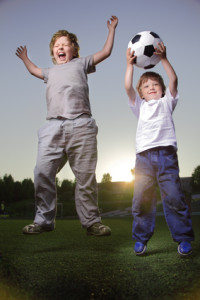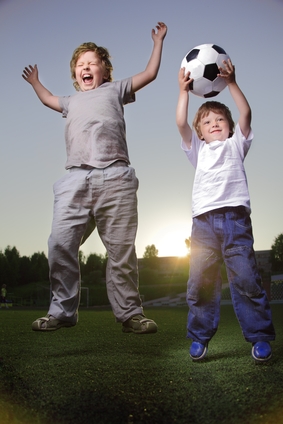 Laura has Down syndrome. She used to be overweight. Since joining a fitness program at her school, she’s more confident and focused, and yes, she’s also lost 20 lbs.
Laura has Down syndrome. She used to be overweight. Since joining a fitness program at her school, she’s more confident and focused, and yes, she’s also lost 20 lbs.
Michael has autism. He completed OT in preschool and has recently finished 40 sessions of vision therapy. Now he’s sharpening his visual-spatial awareness and motor planning by playing virtual soccer.
Ryan asks all week if it’s Sunday yet. He can’t wait to go to KEEN for basketball. His devoted volunteer George wouldn’t miss a session either.
Fitness Training Builds More Than Muscles
Laura, Michael and Ryan are three of many kids with autism, mental retardation, cerebral palsy and genetic disorders who are growing stronger, happier, and more confident through fitness training.
“Nobody’s ever pushed these kids,” says Laura’s coach Tom Yarnell, who developed the “Power Inside” program at the Pathfinder School in Pittsburgh. “Getting them physically fit and understanding how their bodies work helps them function better in the world.”
He nods toward a young man at a mirror, striking classic body-builder poses and beaming at his own success. “Dan over there has done a complete 180. He weighs 100 pounds, if that, and he’s benched 115 pounds ten times. His energy level is sky high. His handwriting even improved when his fingers, wrists, arms, and core muscles got stronger.”
Marc Sickel, of Rockville, MD agrees, “Improvement in confidence and self esteem go hand in hand with growth in physical abilities.” His program, Fitness for Health, serves those of all ages who need help with coordination, weight management, sensory integration, gross and fine motor skills. Students love his climbing wall and other state-of-the-art equipment.
Sports Training Teaches Kids How to Play
Mike Cohen, founder of Throwback Sports in New York City, recognized that many children who want to be on a team lack the necessary balance and coordination. Through creative drills in tennis, baseball or hockey, his trainees develop the strength, agility and eye-hand coordination they need to be team members.
Mike creates a positive working environment by keeping the drills novel, the child in constant motion and the activity fun. His colored non-pressurized tennis balls are easy to hit with his “Snoopy Slugger” and “Mark McGuire” rackets and bats.
A special attraction at Fitness for Health is their Trazer system. Computer simulators keep children totally engrossed as they “play” virtual reality sports games where they “become” the mouse or joy stick, controlling the action of a life-sized video game with body movement. Decision-making skills sharpen as the simulators recreate the excitement and fun of actual sports competition.
Sports and Camp: Fitness as Social Activity
Fulbright scholar Elliot Portnoy¹s non-profit volunteer organization, Kids Enjoy Exercise Now, grew out of a chance encounter with a child with Down syndrome on a tennis court in Oxford, England.
With the help of highly trained volunteers from churches, synagogues and high schools, KEEN provides free one-on-one recreational sports opportunities for children and young adults with cognitive, physical and emotional disabilities. For some, KEEN sessions may be their only recreational activity.
One of KEEN’s program is for their “twenty-something” athletes, matching the young adults with same age coach/mentors. Activities include weight lifting, stretching on mats, and basketball. KEEN also has other events such as kick ball, scavenger hunts, car washes, bowling and holiday dances.
Think Outside the Box
All children want to play; playing is their basic nature and essential for social, cognitive, and physical development. The best programs for stirring that natural instinct in kids with special needs are flexible, innovative and fun.
How many new ways can you play with a tennis ball, balloon or frisbee? Chase a balloon around a maze. Bounce yellow balls into baskets, lob red and hit backhands with blue ones. Twirl a frisbee on the end of a stick.
Entice children into taking risks. Demonstrate their progress in tangible ways. Keep activities safe and fun by working at present developmental levels, while pushing toward the next.
Parents, teachers and, most of all, the kids themselves delight in the pleasure, strength, independence and self esteem gained through physical fitness.
For more information:
- Fitness for Health
- The Power Inside, Tom Yarnell, 412-833-2777. Yarnell¹s book is “Strength and Conditioning Program For Special Needs Students”. Also see books by Cheatum, Hannaford, Heiberger and Spalding.
- Throwback Sports, Mike Cohen, 212-724-0630 or [email protected]
